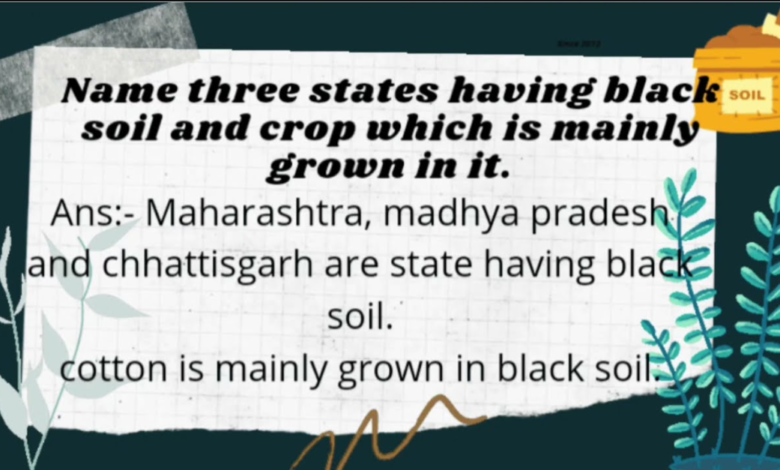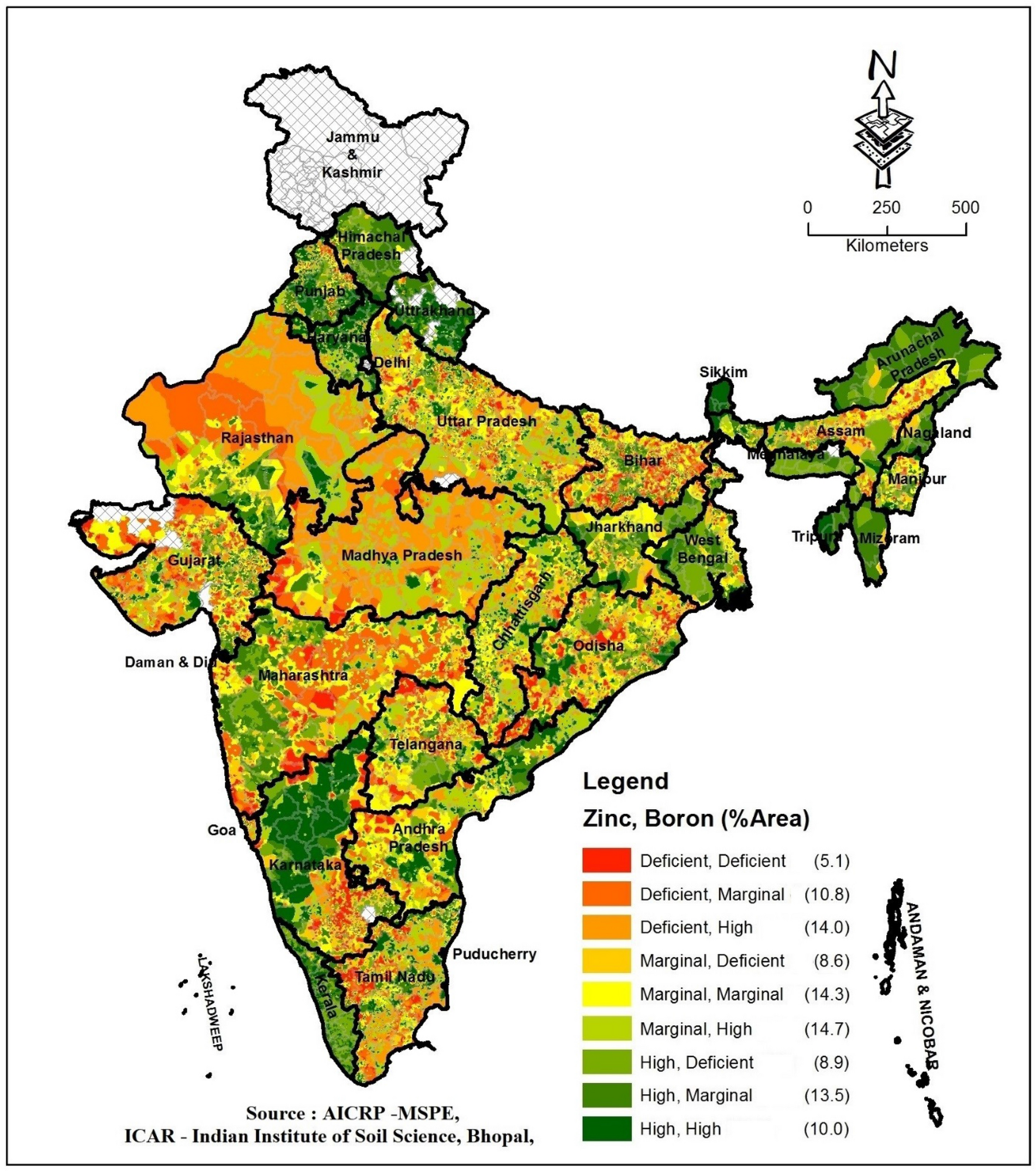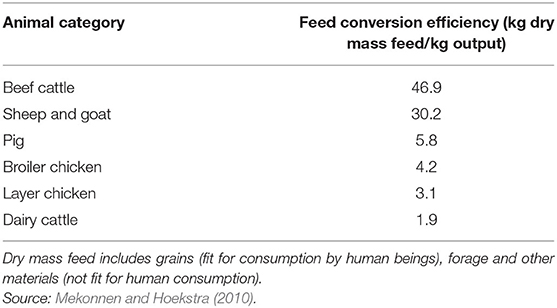Discover the Black Soil States & Top Crops: Maharashtra, Madhya Pradesh, Gujarat

Maharashtra, Madhya Pradesh, and Chhattisgarh are states having black soil, and the crop mainly grown in it is cotton. Black soil, also known as regur soil or black cotton soil, is a type of fertile soil that is rich in minerals and organic matter.
It is characterized by its dark color and sticky texture when wet. Three states in India known for their black soil are Maharashtra, Madhya Pradesh, and Chhattisgarh. These states have large agricultural areas where black soil is prevalent. The main crop grown in black soil is cotton.
Cotton thrives in this type of soil due to its ability to retain moisture and provide the necessary nutrients for the plant’s growth. Farmers in these states cultivate cotton as a major cash crop, contributing to the overall agricultural economy of the region.

Credit: www.nature.com
States With Black Soil
Black soil, found in Maharashtra, Madhya Pradesh, and Chhattisgarh, is ideal for growing cotton. These states boast fertile lands perfect for cultivating this valuable crop.
Maharashtra
Maharashtra is one of the states in India known for its black soil. This type of soil is rich in nutrients and has good moisture-retaining properties, making it ideal for agriculture. The state’s black soil is mainly found in regions like Nagpur, Yavatmal, and Amravati. It is particularly suitable for the cultivation of cotton, which is the primary crop grown in Maharashtra’s black soil. Cotton plants thrive in this nutrient-rich soil, resulting in high-quality cotton production.
Madhya Pradesh
Madhya Pradesh is another state with a significant presence of black soil. The black soil in Madhya Pradesh is spread across regions like Indore, Bhopal, Gwalior, and Jabalpur. This type of soil is known for its high fertility and moisture retention capacity, making it suitable for various crops. However, the primary crop grown in Madhya Pradesh’s black soil is also cotton. The favorable conditions offered by the black soil contribute to the state’s cotton production, making it a significant contributor to India’s cotton industry.
Gujarat
Gujarat is a state in western India that boasts extensive areas of black soil. The districts of Vadodara, Bharuch, Surat, and Anand are known to have abundant black soil. Similar to Maharashtra and Madhya Pradesh, Gujarat’s black soil is highly fertile and retains moisture effectively. As a result, Gujarat has a thriving agricultural sector, with cotton being the primary crop grown in its black soil. The state’s favorable climate, combined with the nutrient-rich black soil, contributes to the high-quality cotton production in Gujarat.

Credit: www.frontiersin.org
Main Crops Grown
The three states with black soil are Maharashtra, Madhya Pradesh, and Gujarat. Cotton is the main crop grown in these states due to the fertile black soil, which is favorable for cotton cultivation.
Black soil, also known as regur soil or black cotton soil, is a fertile type of soil found in certain regions of India. Three states known for their black soil are Maharashtra, Madhya Pradesh, and Chhattisgarh. The soil gets its distinct black color from its high clay content, which allows it to retain moisture for a long duration, making it ideal for the cultivation of various crops.
Cotton
Cotton is the main crop grown in black soil. The climate and fertility of the black soil make it extremely suitable for the production of cotton. The state of Maharashtra is known as the largest producer of cotton in India, with the majority of its cotton cultivation taking place in areas with black soil. Cotton is a significant cash crop in these regions, contributing to the economic development of the states.
Other Significant Crops
In addition to cotton, black soil is also conducive to the growth of a variety of other crops. Some of the significant crops grown in black soil include:
- Jowar: A major food crop in India, jowar is commonly cultivated in regions with black soil due to its ability to withstand dry conditions.
- Maize: Maize, also known as corn, thrives in the fertile black soil of these regions and is cultivated for both human consumption and animal feed.
- Sunflower: The bright and sunny flowers of sunflower blossom in black soil regions, making it a popular crop choice.
- Chilli: The hot and spicy flavor of chilli peppers finds its origin in the black soil regions of India, where it is grown extensively.
- Paddy: Black soil’s moisture-retaining properties make it suitable for the cultivation of paddy, which requires a significant amount of water during its growth.
- Pulses: Various pulses such as chickpeas, lentils, and black gram are grown in black soil areas due to their high protein and nutritional value.
- Onion: Onions, an essential ingredient in Indian cuisine, are also cultivated in black soil regions for their pungent flavor and storage ability.
Challenges And Opportunities
Maharashtra, Madhya Pradesh, and Chhattisgarh are three states in India that have black soil. The crop mainly grown in black soil is cotton.
Challenges In Black Soil Farming
Despite its fertility, black soil farming comes with its own set of challenges. The soil’s high clay content can lead to waterlogging and poor drainage, posing a risk to crops. Additionally, the presence of salts in the soil can affect crop growth, particularly in arid regions. Moreover, the susceptibility of black soil to erosion can lead to degradation, impacting the long-term sustainability of agriculture in these areas.
Opportunities For Growth
Amidst the challenges, black soil farming presents promising opportunities for growth. The high fertility of the soil provides an ideal foundation for cultivating various crops, with a focus on those that thrive in the unique conditions offered by black soil. Furthermore, advancements in irrigation and drainage technologies offer potential solutions to the challenges posed by waterlogging and salt presence, enabling more sustainable and efficient farming practices. The rich composition of black soil also offers opportunities for organic and sustainable farming practices, catering to the growing demand for such products in the market.
| States | Main Crop |
|---|---|
| Maharashtra | Cotton |
| Madhya Pradesh | Cotton |
| Gujarat | Cotton |
Conclusion
Black soil farming, while challenging, presents significant opportunities for growth and agricultural development. By leveraging innovative technologies and sustainable practices, farmers can harness the potential of black soil to cultivate a diverse range of high-demand crops, contributing to both economic prosperity and sustainable food production.

Credit: www.studypool.com
Future Of Agriculture In Black Soil States
Black soil states like Maharashtra, Madhya Pradesh, and Gujarat hold immense potential for the future of agriculture. With their fertile black soil, these states are ideal for cultivating specific crops that thrive in such conditions.
Technological Advancements
Modern technologies are revolutionizing agriculture in black soil states. Through precision farming and the use of drones, farmers can optimize crop yields and minimize resource wastage.
Sustainable Farming Practices
Incorporating sustainable farming practices such as crop rotation and organic farming techniques is crucial for preserving the long-term productivity of black soil. This ensures the soil remains fertile for future generations.
Frequently Asked Questions
Which State Has Most Black Soil?
The states with the most black soil are Maharashtra, Madhya Pradesh, and Chhattisgarh. The main crop grown in black soil is cotton.
Which Type Of Crop Is Found In Black Soil?
The black soil type is found in states like Maharashtra, Madhya Pradesh, and Chhattisgarh. It mainly supports the cultivation of cotton.
What Are The Black Soil Crops In Karnataka?
Maharashtra, Madhya Pradesh, and Chhattisgarh have black soil. Cotton is the main crop grown in this region.
How Many Types Of Soil Are Found In India?
In India, there are seven types of soil deposits: alluvial, black, red, laterite, desert, forest and mountainous, and marsh soil.
Conclusion
Maharashtra, Madhya Pradesh, and Gujarat are the main states with black soil. Cotton is predominantly grown in these regions due to the soil’s fertility and moisture retention properties. Learning about these states and their predominant crop offers valuable insights into India’s agricultural landscape.



